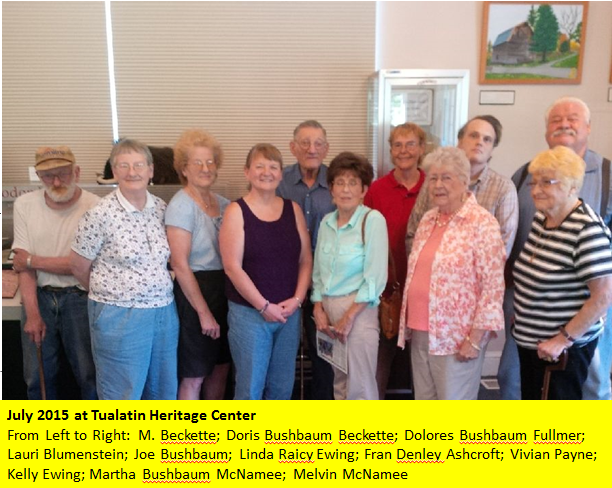Bushbaum Family
Oral History of : Bushbaum Family
Interviewer: Loyce Martinazzi Date: Jul 15, 2015
Location: Tualatin Heritage Center (Video and Audio Recorded)
Agenda (Key words, “tags”)
Scog, Minnie
Raicy, John and Hazel
Malsom Joe's mom from North Dakota
Denley Briefly mentioned local family
Rogers, Drucilla (Duffy)
Elligsen, Harry
Athey, Elvin
Borland, Walter
Schatz, Burt
Schaber, Leonard
Payne, Bob
Larson, Charlie (Charles)
MacNamee Relatives to Bushbaum's
Blumenstien Relatives to Bushbaum's
Hagen Charles Carpenter who built barn
Saum Local family Jake Steve Gladys George
Reed Gordon was one of the "boys" involved with watermelon robbery
Brooks Victor. Made wine for $1 per jug.
Wilke Ernest
Robinson Newt Lizzy (Elizabeth) Ed Grace
Bushbaum Joe (Joseph) Ray (Raymond) Martha Florence
Theobald Carl
Moonshine shivaree granite pigs bears filberts still revenuers dam millpond Boons Ferry Boreland Road vegetables cantaloupe watermelon WPA W.P.A. toilet Germany boarding house city hall old school Robinson Store railroad Prosperity Park Tigard Safeway Hoffman Store Nyberg Lane meteor whiskey wine Rolling Hills potatoes
Charivari (or shivaree or chivaree, also called "rough music") is the term for a French folk custom in which the community gave a noisy, discordant mock serenade, also pounding on pots and pans, at the home of newlyweds. The loud, public ritual evolved to a form of social coercion, for instance, to force an as-yet-unmarried couple to wed.
The community used noisemaking and parades to demonstrate disapproval, most commonly of "unnatural" marriages and remarriages, such as a union between an older widower and much younger woman, or the too early remarriage by a widow or widower. Villages also used charivari in cases of adulterous relationships, wife beaters, and unmarried mothers. In some cases, the community disapproved of any remarriage by older widows or widowers. Charivari is the original French word, and in Canada it is used by both English and French speakers. Chivaree became the common spelling in Ontario, Canada. In the United States, the term shivaree is more common.[1]


